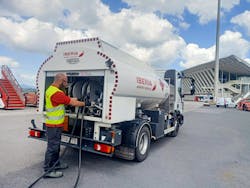Iberia Airport Services and Repsol Use Renewable Fuel in Handling Activities at Bilbao Airport
For the first time in Spain, Iberia Airport Services and Repsol carry out handling activities at Bilbao airport with 100% renewable fuel. Over the next month, both companies will use a sustainable fuel, treated at the Petronor plant, for all aircraft and customer service operations at Loiu Airport.
Renewable fuels are those that are produced from renewable raw materials. They produce net zero emissions and make an effective contribution to the green transition of the airline industry. Advanced biofuels are made from organic waste such as used vegetable oils, animal fats, and agricultural and forestry residues that are not intended for food.
Repsol has manufactured and marketed biofuels for more than two decades, and since 2019, it has incorporated organic waste in its manufacture. In 2025, Repsol will have a production capacity of 1.3 million tonnes of renewable fuels and will reach more than two million tonnes in 2030, which will position it as a leading company in the production of these fuels in Spain and Europe.
The Operation with HVO in Bilbao in Figures
For one month, Iberia Airport Services will supply almost all of its handling teams with 5,000 liters of 100% renewable Repsol fuel, treated at the Petronor refinery in Muskiz, just 30 kilometers from Loiu airport. They will refuel their conveyor belts, ladders, electrical and pneumatic equipment, planters, tractors, platforms, and pushback trailers, leading to a reduction of some 12.5 tonnes of CO2 over the next month.
Iberia Airport Services serves nine companies in Loiu, including Vueling and Iberia, and all of them will benefit from this pioneering initiative.
Carlos Suarez, director of mobility at Repsol, said, “This pioneering initiative, carried out along with Iberia and Petronor at Bilbao airport, reinforces Repsol's commitment to renewable fuels, one of the main levers for becoming a net zero emissions company by 2050. Renewable fuels already reduce CO2 emissions from transport and are compatible with the current vehicle fleet and existing distribution and refueling infrastructures, without the need to make any modifications. These fuels broaden the range of technologies to decarbonize the hugely important airport services sector.”
For his part, José Luis de Luna, director of Iberia Airports, said, “At Iberia Airport Services we are committed to achieving the goal of net zero emissions in our airport services throughout the network by 2025. To do this, we are going to invest more than €100 million in some thirty initiatives, including the electrification of more than 80% of our equipment, and the use of alternative energies, such as HVO, a fuel that allows us to reduce equipment emissions by 100%."
For José Ignacio Zudaire, deputy to the CEO of Petronor, “It is meaningful that the first time that renewable fuel is used in Spain in airport handling activities is in Bilbao. It is a wonderful opportunity to highlight our commitment and industrial capacity for the production of sustainable fuel from waste at our Muskiz refinery. There is no doubt that we are advancing, on the basis of solid industrial and technological foundations, towards the decarbonization of transport with our net zero emissions fuel.”
Iván Grande, director of the Bilbao Airport, pointed out that "Aena supports this initiative in line with its role as promoter and facilitator of the sector in terms of decarbonization of air transport. At Aena we are working on multiple projects that completely revolutionize our energy consumption model. We believe in new fuels as the best tool to fight climate change. The development of new clean energy sources will be crucial for the sustainability of the aviation sector and transport in general.”
This initiative is part of the collaboration agreement towards more sustainable mobility between Iberia and Repsol in 2021. Since then, both companies have collaborated on the AVIATOR project, to analyze the impact of aviation emissions on the air quality at airports. On the other hand, they also made the first Madrid-Bilbao flight and the first long-haul flights to Washington DC, Dallas Fort Worth and San Francisco using sustainable fuel produced from waste. In addition, in January 2022 Iberia joined the SHYNE (Spanish Hydrogen Network) consortium, led by Repsol to accelerate the development of green hydrogen in Spain. Likewise, this year both companies began to offer the airline's corporate clients the purchase of sustainably sourced fuel, which allows them to reduce emissions and decarbonize their business trips.
The strategic agreement between Repsol and Iberia lays out a roadmap for the promotion of sustainable aviation fuels (SAF) for the coming years. These products will be processed in the first advanced biofuels plant in Spain, in Cartagena, Murcia, which is scheduled to come into operation in 2023. Also in 2025, Repsol and Iberia plan to operate with synthetic SAF (e-fuel). produced at the Petronor plant (Bilbao).
